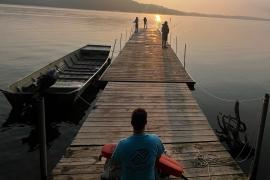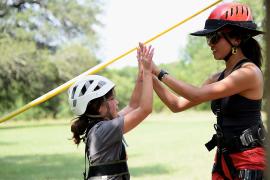We believe in the power of yet. Your summer staff team hasn’t been hired yet. There are veteran staff out there who have not committed for another summer yet. New staff have not found their way into your camp story yet.
Summer is on the horizon . . . the pressure to fill remaining positions heightens. It is easy to convince yourself the next warm body is good enough — a decision you may regret later. We encourage you to stop, take a deep breath, and reflect on the intentional framework designed to build your staff team at the start of recruiting season. Ideas will be shared here to help you develop a plan allowing for the flexibility to secure additional veteran staff and hire new rock stars. Staying true to your camp’s mission will allow you to act in ways that will avoid panic-hiring and move you closer to your vision for staff culture long term.
Reflect
Your camp culture reflects your values in action. The recruiting plan you set in motion in September should not be abandoned just because camp is only a few months or weeks away. Take a moment to remember (and jot down) three words that describe the camp culture you envision. What goals did you initially set regarding staff for the upcoming summer based on those words? The culture you envision and goals you have for staff should not change even though the camp season is inching closer. (Note: this is a good exercise to do with your staff at various points of the year. It will help you gauge if the current culture is moving towards or away from your ideal culture.)
Recruiting staff, like losing weight, is hard. So often we say that we’ve tried everything and nothing works. What if while trying to lose weight, we stop short of diet and exercise, those things that would really make a difference or move the needle while trying to shed some extra pounds? To incorporate diet and exercise into our routine, it may require changing habits (going to the gym), discipline (avoiding desserts), and more time (to research healthy foods and count calories).
How have you stopped short with your own recruiting efforts? What are those things that require changing habits (using multiple platforms to communicate with staff), discipline (talking less and listening more), and time (empowering current/former staff to recruit by providing tools and resources)? Some good advice to heed: “If you do what you always did, you will always get what you always got.” To move the needle with our camp culture and hire the right staff who are key to that culture, we have to break away from this kind of thinking (and stop complaining!).
It is interesting that when numbers of potential staff are down at job fairs, we complain. On the flip side, when the number of applicants from online employment search engines are up, we also complain. With either scenario, the college student wearing a suit and tie to a summer employment expo or the overwhelming number random applications to sort through from an online job post, most people don’t understand camp. It seems easier; however, to find staff when you have applicants, even if they do not completely comprehend what they are applying for. It is your job to tell them!
Consider the quote by Margaret Mead: “Never doubt that a small group of thoughtful, committed citizens [counselors] can change the world [camp]; indeed, it's the only thing that ever has.” A related, thought-provoking question to ponder: If staff were 100 percent committed to camp, what is the absolute minimum amount of staff you can have in order to keep camp safe and programming exciting?
Think about that group of superstar staff who are very invested in camp. Now think about those staff who are only 75 percent or 50 percent committed to camp (this is your staff who have a “C” average or below) and how they hinder or bring down those staff who are “all in.” Recall the time and energy this group of staff require to coach and support. These average or below average staff are robbing time from those who are carrying out the mission of camp and positively impacting the campers in every possible way. If someone was vandalizing camp property, stealing program equipment, or taking food from the kitchen, they would most likely be fired. So, why hire staff in the first place who are time thieves and contribute to a less-than-exceptional camper experience?
Develop — Returning Staff
We believe that it is important to trust your hiring process and what you look for in staff before panic mode starts.
This time of year can cause staff to be in panic mode as well. Parents, college professors, and advisors are putting pressure on students to confirm summer plans. Have you checked back with staff who in the fall were unable to commit to being at camp, but now find themselves without an internship, travel adventure, or employment? How can you be flexible and think outside the box as you develop a plan for getting excellent staff to return to camp?
Have you considered job sharing or shift work? What if some really great staff members can only come for part of the summer? How can you be intentional about bringing those veteran rock stars in because they positively contribute to the camp culture even if there for a short period of time?
Sometimes two or three staff/alumni can fill the weeks needed to make a full summer. Or a part-time nurse/cook can be hired to fill in while you are still looking for a full-time person who is the right fit for the job. Or someone who is extremely adaptable can come in as a floater and cover for a staff member who has a family reunion or wedding to attend. As long as you are transparent with the staff who are staying the entire summer and letting them know why some staff members are coming late or leaving early, they will be grateful for the new energy these folks bring to the camp community!
We also encourage you to revisit reasons that were possibly getting in the way of a veteran staff member’s success by asking the following (more detailed questions for each category can be found here):
- Were there stressors that can be reduced?
- Were there unmet needs that can be addressed?
- Were hard skills required to do the job lacking that with additional training the staff member would have more confidence?
- Was there a deficit in intra- or interpersonal skills that coaching could enhance?
Now is also a great time to help returning staff remember their why: why they love camp, how much they have grown, the goals they are working on, and the impact they make with campers. Don’t let them forget! One way to do this is to mail staff members a photo from the recent summer that shows them in their “element” along with a handwritten note. You can also ask staff to send a video of themselves sharing why they love camp or pose questions on social media that invoke good memories. Don’t forget to include medical, food service, maintenance and other folks who are key to your camp community in your efforts!
Develop — New Staff
When making a plan to hire staff who are new to your camp community, it is important to have an understanding of who you are going to find on college and university campuses today. It is best not to assume that all students fall into the 18–22 range, are in four-year programs, and take classes full-time. With a rising number of students over the age of 25, enrolled in two-year programs, employed part- or full-time, and raising families while taking classes, this may be cause to rethink strategies for meeting new faces. We know of camps who are thinking outside the box where this is concerned and are exploring resources such as RVerJobExchange or Workers on Wheels for potential camp staff.
If you notice, it is extremely hard to distinguish the difference between camps at a job fair. Most everyone has a similar display with a beautiful natural setting, smiling faces, and exciting activities. So, how is someone who knows nothing about camp able to differentiate and see themselves as a vital part of your organization? You will attract employees if you can explain why your mission is compelling. If people ghost, it may be that they really don’t know why they are important. Help new staff understand why their being at camp is important, the compelling reason they matter . . . not that you don’t want to have to find someone to replace them.
One of the keynote speakers at this year’s ACA National Conference started his presentation by playing Queen’s “We Will Rock” you as he walked down the aisle from the back of the auditorium. Without any prompting from the speaker, the audience began clapping and stomping to the beat. It was as if the audience started the presentation and not the speaker. Queen found the best way to get an audience to love an event is to let them own it.
Act
Whether veteran or new staff, we must communicate to staff they are an important part of the “show” (mission). By communicating this to each person we employ, we remind ourselves to be true to our vision for camp culture. Culture reflects values in action.
Take a deep breath. Think again before hiring the next warm body. You’ve got this!
This blog is part of Project Real Job’s initiative to support camps’ efforts to recruit, hire, and retain staff.
Kim Aycock, MST, has 30+ years of experience developing young people with skills robots are unable to do. While blending the talents of a master teacher with the knowledge of a seasoned camp expert, Kim ignites the learning for varying levels of campers and staff worldwide. She has the ability to connect with and motivate learners of all ages through her interactive and innovative presentations. Kim speaks professionally at regional and national conferences, presents webinars, contributes regularly to Camping Magazine and ACA blogs, and serves as Co-Chair of ACA’s Project Real Job Committee. More information can be found at: www.kimaycock.com.
Jolly Corley, MS, works each summer developing 150 emerging leaders to create a dynamic & thoughtful camp culture through staff development. Using games, theatre & life experiences she prepares staff to understand that our own experiences are the most useful tools for reflection & growth to a solid foundation in becoming leaders for life. Her work with jolly corley, llc, takes her around the world providing training to develop a staff culture that promotes personal & professional growth. Check out jollycorley.com for more information.
Photo courtesy of Camp Kupugani
The views and opinions expressed by contributors are their own and do not necessarily reflect the views of the American Camp Association or ACA employees.




